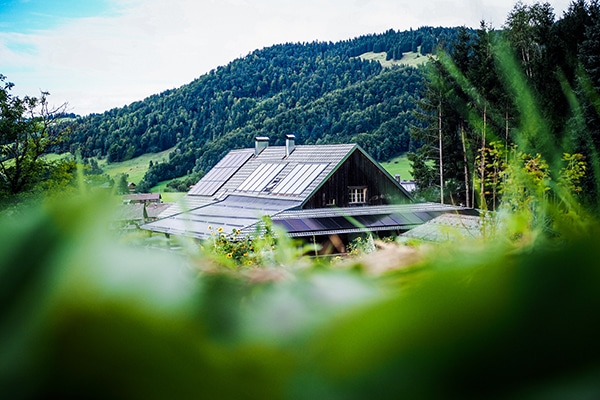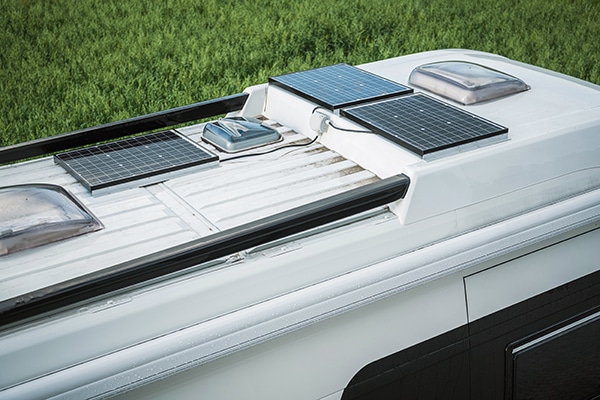Solar panels can be expensive, so choosing the best solar panels and understanding the basic criteria to make an informed decision is important.
This article will discuss basic solar panel criteria – types, power, efficiency, etc., so you have the information you need to proceed with your selection.
I’m a proponent of solar energy. Solar panels provide independence for you and your family. There are long-term savings associated with solar energy, but for me, being able to live and travel independently in uncertain times is important.
Table of Contents
What Types of Solar Panels are Available?
There are three basic types of solar panels on the market that you need to know.
- Monocrystalline
- Polycrystalline
- Thin-film panels
Monocrystalline or single-crystal panels are made from pure silicon crystals and are the most efficient solar panels. If you have space constraints or want to use panels on a camper, RV, boat, etc., these are the panels you should consider. Unfortunately, they are also the most expensive.
Polycrystalline panels are made from pieces of silicon crystals that are melted together before being sliced into the wafers used to create a solar panel.
Thin-film solar panels are composed of three types of thin-film panels. The most common type is cadmium telluride (CdTe) which has a layer of glass to protect it. Amorphous silicon (a-Si) panels are made of non-crystalline silicon placed on a base of plastic, metal, etc. Finally, there Copper Indium Gallium Selenide (CIGS) panels which are placed between conductive layers.
How to Calculate How Many Solar Panels You Need

Using your electricity bill, the easiest way to estimate your energy usage is to check your kilowatt-hour usage (kWh). If you divide this by 12, you’ll know the average monthly energy usage. You can divide by 30 to determine your average daily use.
If you are using a small cabin, RV, boat, etc., add up the usage for your appliances. Most appliances and electronics have kWh or watts listed on them or in their owner’s manual.
For example, if you only have watts. You have 10×60 watt light bulbs in your cabin. This is 600 watts, and you use them 6 hours per day for 3,600 watts. Divide this by 1,000, and your kWh per day is 3.6 kWh.
The average US home uses about 30 kWh per day.
There are a few things to consider.
- How much peak sunlight do you receive? These peak sun maps provide good data.
- Keep in mind that there will be shade and cloudy days.
- The location of your panels and angle to the sun is important. You can consider using panels you can redirect throughout the day to optimize the sunlight you receive.
- Use a buffer of 20%-25% for inefficiencies, etc.
- Finally, remember that you can use fewer panels if you use more battery storage. You will want batteries if you use energy at night or on cloudy days.
Solar Panel Factors to Consider
Below are features and factors to consider when narrowing down the panels to purchase.
Tolerance – Power tolerance measures how much electrical power a panel produces above or below its rated capacity.
Conversion Efficiency – This refers to the ability of the panel to convert input energy into output energy. The average panel efficiency should be 15% to 16% or better.
Durability – Factor in the weather conditions of your location and select panels with appropriate wind or snow loads.
Longevity – Solar panel manufacturers guarantee a lifespan of 25 to 30 years. Make sure to purchase from reliable sellers to ensure you get top-quality panels that will last a long time.
Warranty – A solar panel warranty is typically two parts – performance and equipment (materials). Performance is usually 90% at ten years, dropping to 0% at 25 years. The materials warranty will typically cover manufacturing defects, premature wear, tear, etc. The more extended the warranty, the better, and they vary by manufacturer.
Size & Weight – The dimension of your panels is important, as is the weight. Make sure you measure your space and have the structure to hold the weight.
Watt Capacity – Most panels in the market have a 250W to 400W capacity. The higher the conversion efficiency of the panels, the higher the energy output.
Solar Panel Quality

When you shop for solar equipment, you should check the product specification sheets to ensure the panels meet specific solar panel testing and certifications. These tests are important in determining quality and performance and confirming standard safety requirements.
IEC: International Electrotechnical Commission
The IEC establishes international assessment standards for electronic devices, including photovoltaic or solar panels. They do not do the actual testing of the panels. However, they set the standards for other testing facilities to comply with when checking solar panel quality.
Solar panels that meet IEC 61215 are tested for electrical characteristics such as insulation resistance and wet leakage current. This also means the product was tested for wind and snow loads to ensure durability. The IEC 61215 stamp also says that the product passed climate tests such as hail impact, UV exposure, hot spots, and humidity freeze.
IEC 61701 tests for salt mist corrosion which is good to know if your house is near the beach. If you live near a farm with livestock, ammonia corrosion can reduce a solar panel’s efficiency and durability. You must then check if the product passes IEC 62716.
UL: Underwriters Laboratories
UL 1703 confirms the safety and performance of a solar panel module. In addition, products undergo climate and aging tests to protect against fire and electrical hazards. More rigid testing that passes international safety and performance is UL 61730.
How Much Do Solar Panels Cost?
A typical solar panel for a DIY installation will cost $200 – $300. his varies based on type and watts. The monocrystalline solar panel is the most expensive, and a 200-watt panel is more expensive than a 100-watt one.
Using Reviews and Forum Feedback
Choosing the best solar panels can be confusing, so do your research. Here are reviews and forums. I like forums because the users typically have a good experience, and you generally get honest first-hand feedback.
Below are a few forums you can check out.
Beyond this, if you’re looking for resources, you can also check reviews in the form of blog posts and videos. Just be sure that the review is independent and not sponsored, as this may sway the feedback.
I don’t often use Amazon reviews anymore. This is because there has been a lot of chatter about the validity of the reviews. However, if you use them, read them all and take them with a grain of salt.
Final Thoughts
Conditions in our world today encourage people to become more self-sufficient and less dependent on government and big business. Solar, and other renewable energy sources like wind and water, are good ways to take those first steps.
Planning is one of the most important steps when installing solar panels and a solar energy system.
Compare your energy consumption to the amount you need to install solar panels.
Installing a standard grid-tied system can be expensive, but installing a system that meets your needs can be much less costly. Solar is a fun project, but you are still working with electricity. Make sure you contact a professional if you don’t have the needed experience.
